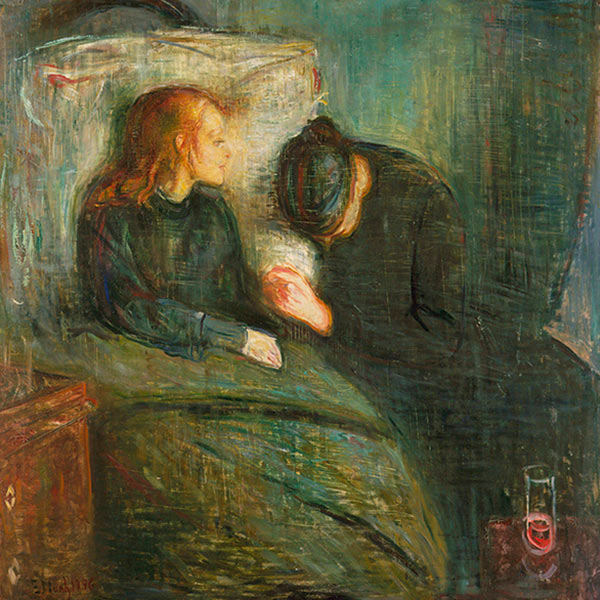I find myself coming back to that great phrase, “You cannot love what shocks you.” Flannery O’Connor said the sisters in Atlanta [from Our Lady of Perpetual Help Free Cancer Home] “were shocked at nothing.” If we are shocked by suffering, if we are repulsed, then we will try to eliminate it at all costs, including killing the person who suffers. We will justify this response by tenderness, the death-dealing tenderness which is, as she said, “wrapped in theory.” Theory, in whatever shape it takes – whether philosophical, political, social, religious, or theological – is a great anesthetic that eliminates the spiritual pain upon which suffering – authentic human suffering – is concentrated.
The refusal to accept the challenge of suffering reflects our culture’s allergy to transcendence.

Edvard Munch, The Sick Child, 1896
Again, to paraphrase O’Connor, human imperfection is a sign of transcendence. It is a sign of the incompleteness of our lives on earth, an incompleteness at the very heart of what we are called to be and were created to be as human persons. Today’s Western culture is incapable of dealing with personhood. As a result, the reality of the human person that points toward transcendence is negated by reducing the person to the level of an object (an object that can be manipulated). In this way, all suffering becomes merely a technical problem that requires fixing.
But we must not treat human beings as objects. That would mean that we have reduced the life of the person to a monologue – an improvised monologue that is meaningless. The true life of the human person is always a dialogue – a dialogue with someone else, with others. Human life is a drama because human freedom points toward the author of this drama, to a script not written by us and not written on earth. It’s interesting that the Book of Job begins in heaven, where the drama that is about to unfurl is written. The relatively modern versions of that story – say in Faust by Goethe – also begin with a dialogue in heaven.
Suffering confronts us with the mystery of the transcendence of the person and their orientation to a spiritual reality that is not of this world.
Our response to suffering must be to walk along with the sufferer toward God, to risk our own identity by relating with the one who suffers in his or her questioning.
Ironically, the existence of suffering has been used to discredit the existence of God. I propose that it is because there is a God that there is suffering. Suffering is a sign of God, a cry to the author of life. Our response to suffering must be to walk along with the sufferer toward God, to risk our own identity by relating with the one who suffers in his or her questioning. Often the one who is suffering is in a physical or mental state where he or she cannot question anything. Then we must question for them. In a mysterious sense, a solidarity is established between the sufferer and the co-sufferer. To be a co-sufferer is to involve one’s personhood with the other, as the sufferer cries out to God. Authentic suffering, therefore, is a dialogue.
To co-suffer clearly doesn’t mean to feel the pain of the other – but it is to share the existential questioning of the sufferer. To claim to feel the physical pain of the other is sentimentality; it is artificial tenderness. To co-suffer – to be a companion with the sufferer – is to walk alongside them toward transcendence. The one who does not co-suffer and is not prepared to do this cannot speak about it. Such a person does not know the truth and does not speak the truth. He or she is a liar – a deceiver, to use the words of Walker Percy. The task of someone confronted with the suffering of the other, especially people in the healthcare ministry, is to be willing to co-suffer. Co-suffering affirms the personhood of the sufferer and is an act of love. Co-suffering is the way we love the one who suffers.
Source: Lorenzo Albacete, Cry of the Heart (Seattle, WA: Slant, 2023) 42–44. Used by permission from Slant Books.
